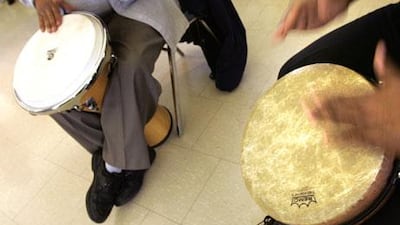Tune in, chill out and beat the blues in the process. According to new research, music therapy can effect huge changes in the lives of people suffering from mental-health issues such as depression.
Studies from the University of Jyväskylä in Finland reveal that by combining counselling sessions with classes that teach music skills - such as learning to play the drums - people with anxiety disorders and depression make greater progress and respond better to treatment than they would with counselling alone.
"Music therapy has specific qualities that allow people to express themselves and interact in a non-verbal way," lead researcher professor Christian Gold explained upon the release of the findings. "Even in situations when the subjects cannot find words to describe their inner experiences, the music sessions help them to open up."
The Finnish study, carried out on 79 people engaged in ongoing treatment for the symptoms of depression, isn't the first of its type to examine therapy that involves playing music. In 2008, a review of existing studies into the treatment of depression - which is thought to affect as many as 121 million people worldwide - highlighted four out of five separate studies, which found reduced depression symptoms in people who took part in music therapy.
This review, carried out by the Cochrane Library, an international organisation that evaluates medical research, also revealed that the format of the classes were key to their success.
Simply putting people in a room and telling them to tap away on a drum kit wasn't enough. "The greatest impact came when there was a coherent explanation of what music therapy does and why the therapists were there," said lead researcher Anna Maratos.
This was best highlighted by the fifth study Maratos examined. In that, the researchers could find no positive effect on treatment from music therapy - but that was also the study where no explanation was given to the subjects as to why they were being asked to play music.
So how exactly does music bring cheer to those suffering from mental illness? Psychologists such as Gold have suggested that music therapy is simply a fresh, less threatening means of getting people to open up - especially those feeling a sense of isolation and alienation. Music helps them connect in ways that counselling perhaps doesn't.
The physical act of drumming - the subjects in the Finnish study received two one-hour sessions playing an acoustic African djembe drum - can produce a euphoric sense, too. The body produces "feel good" hormones while doing what can be a quite intense upper body and cardiovascular workout.
"Music therapy can certainly be an energising experience and cathartic at times," explains Angela Harrison of the British Association for Music Therapy. But it goes beyond the euphoria of performance. "Just as a 'talking' therapy may help a person to understand him or herself better, develop new coping mechanisms and improve his or her interpersonal skills, so it is with music therapy.
"The therapist prepares the ground by providing instruments and training," adds Harrison. "The level of trust in the sessions can act as a great motivator and allows people to safely access and express feelings and thoughts that lie beyond words.
"Music can work at a deep level to stir memories, evoke images and emotions that can be shared, understood and processed with the help of the therapist."
For those who remain sceptical, evidence continues to show that music can rewire the way our minds work in a number of positive ways.
Dr Costas Karageorghis, a sports and exercise scientist at Brunel University in England and author of Inside Sport Psychology, has been leading the way in examining how music stimulates physical activities and boosts athletic performance.
"Since the Old Testament depiction of young David curing King Saul's depression with the dulcet tones of his harp, we have been aware of the therapeutic effects of music," says Karageorghis. "But my research has also shown that music is able to achieve an ergogenic effect - heightening arousal levels, creating positive mood states and distracting attention from perceptions of fatigue."
At low-to-moderate exercise intensities, music has been found to reduce the perception of effort by as much as 12 per cent. "It also has a 'metronomic' effect - we run to the beat - which regulates our movements and makes them more energy efficient," adds Karageorghis.
As with the Cochrane report, the key factor in Karageorghis's work is that it's not solely about listening to music - you need to engage with it too. In fact, just lying back and listening to a sound system could actually be bad for you.
According to a study of 106 teenagers by the University of Pittsburgh's School of Medicine, your emotional health suffers if you spend more time listening to music than reading, for example, or combining your music with any kind of physical movement.
Researchers found that the teenagers who spent the majority of their spare time listening to music were 8.3 times more likely to be depressed. But what remains unknown in this research is cause and effect: the experts could not determine if depressed people begin to listen to more music to escape, or if listening to large amounts of music can trigger depression.
Perhaps it's best to combine listening to classical music with a cerebral task - something the proponents of the "Mozart Effect" might recommend. A number of research groups, including those from the University of California's Center for the Neurobiology of Learning and Memory, found that listening to Mozart's music in particular can help subjects solve puzzles and do mental chores much quicker and more accurately.

